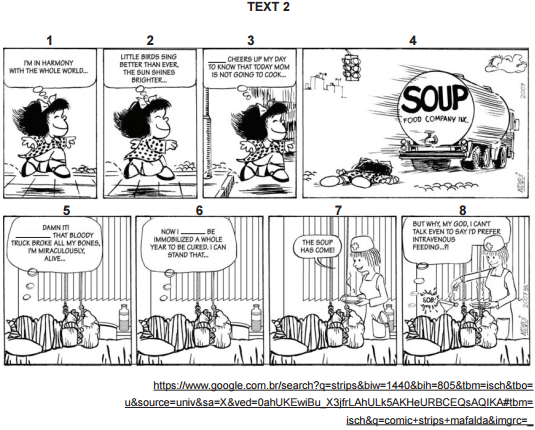O trecho sublinhado em “the genre is as broad as the
imagination” (3°
parágrafo) expressa uma



Backpacs” (title) - a large bag carried on the back.
“strap” (l. 2) - a strip of leather, cloth or other flexible material.
“lugging” (l. 5) - carrying something with great effort. “prof” (l. 8) - professor.
“sprains” (l. 18) - injuries.
“strains” (l. 18) - severe demands on physical strengh.

THE HONEYBEE has... Disponível em: <www.bbc.co.uk/news/scienceenvironment-34749846>. Acesso em: 21 set. 2016.
Leia o texto e responda à questão.

Adapted from: https://www.dailymail.co.uk/sciencetech/article-7399879/European-capital-cities-dominate-list-worlds-FASTEST-public-transport-systems.html
Last access: August, 29, 2019.







EVANS, Stephen. Disponível em: <www.bbc.co.uk/worldservice/learningenglish/language/wordsinthenews/2011/05/110518_witn_electric_cars_page.shtml>. Acesso em: 2 jun. 2011.

TEXTO:



BRYANT, Nick. Record blow for teenage sailor. Disponível em:<www.bbc.co.uk/worldservice/learningenglish/language/wordsinthenews/2010/05/100505_witn_sailing.shtml>. Acesso em: 5 jun. 2010.
Assinale a alternativa correta considerando os elementos gramaticais do texto.
The words “Earlier” (line 46) and “largest” (line
44) are, respectively, the comparative and
superlative of “early” and “large”.
Texto
A brief history of Facebook


(Adapted from a text available at
http://www.guardian.co.uk/techonolgy/2007/jul/25/media.
newmedia. Accessed on 02/6/2011, at 9h10min)

INSTRUÇÃO: a questão deve ser respondida com base no texto a seguir.


Adapted from:< http://www.psychologicalscience.org/index.php/news/releases/consumerism-and-its-antisocial-effects-can-beturned-onor-off.html> and < http://grist.org/living/consumerism-plays-a-huge-role-in-climate-change/>Acessed on September 1st, 2016.

Fire Devastates Brazil's Oldest Science Museum
The overnight inferno likely claimed fossils, cultural artifacts, and more irreplaceable collections amassed over 200 years.
By Michael Greshko ______________________________________
PUBLISHED September 6, 2018
Major pieces of Brazil's scientific and cultural heritage went up in smoke on September 2, as a devastating fire ripped through much of Rio de Janeiro's Museu Nacional, or National Museum. Founded in 1818, the museum is Brazil's oldest scientific institution and one of the largest and most renowned museums in Latin America, amassing a collection of some 20 million scientifically and culturally invaluable artifacts.
The Museu Nacional's holdings include Luzia, an 11,500-year-old skull considered one of South America's oldest human fossils, as well as the bones of uniquely Brazilian creatures such as the long-necked dinosaur Maxakalisaurus. Because of the auction tastes of Brazil's 19th-century emperors, the Museu Nacional also ended up with Latin America's oldest collection of Egyptian mummies and artifacts.
Even the building holds historical importance: It housed the exiled Portuguese royal family from 1808 to 1821, after they fled to Rio de Janeiro in 1807 to escape Napoleon. The complex also served as the palace for Brazil's post-independence emperors until 1889, before the museum collections were transferred there in 1902. In an September 5 email, Museu Nacional curator Débora Pires wrote that the entomology and arachnology collections were completely destroyed, as was most of the mollusk collection. However, technicians had braved the fire to save 80 percent of the mollusk holotypes—the specimens that formally serve as the global references for a given species. The museum's vertebrate specimens, herbarium, and library were housed separately and survived the fire.
(…)
An Irreplaceable Loss
It's not yet clear how the fire started, but it did begin after the museum was closed to the public, and no injuries have yet been reported. Firefighters worked through the night to douse the burnt-out shell of the main building, but it seems the blaze has already seared a gaping hole in many scientists' careers.
“The importance of the collections that were lost couldn't be overstated,” says Luiz Rocha, a Brazilian ichthyologist now at the California Academy of Sciences who has visited the Museu Nacional several times to study its collections. “They were unique as it gets: Many of them were irreplaceable, there's no way to put a monetary value on it.”
“In terms of [my] life-long research agenda, I'm pretty much lost,” says Marcus Guidoti, a Brazilian entomologist finishing up his Ph.D. in a program co-run by Brazil's Federal University of Rio Grande do Sul.
Guidoti studies lace bugs, an insect family with more than 2,000 species worldwide. The Museu Nacional held one of the world's largest lace bug collections, but the fire likely destroyed it and the rest of the museum's five million arthropod specimens. “Those type specimens can't be replaced, and they are crucial to understand the species,” he says by text message. “If I was willing to keep working on this family in this region of the globe, this was definitely a big hit.”
Paleontologist Dimila Mothé, a postdoctoral researcher at the Federal University of the State of Rio de Janeiro, adds that the blows to science extend beyond the collections themselves. “It's not only the cultural history, the natural history, but all the theses and research developed there,” she says. “Most of the laboratories there were lost, too, and the research of several professors. I'm not sure you can say the impact of what was lost.”
Brazil’s indigenous knowledge also has suffered. The Museu Nacional housed world-renowned collections of indigenous objects, as well as many audio recordings of indigenous languages from all over Brazil. Some of these recordings, now lost, were of languages that are no longer spoken.
“I have no words to say how horrible this is,” says Brazilian anthropologist Mariana Françozo, an expert on South American indigenous objects at Leiden University. “The indigenous collections are a tremendous loss … we can no longer study them, we can no longer understand what our ancestors did. It’s heartbreaking.”
On Monday, The Brazilian publication G1 Rio reported that ashes of burned documents—some still flecked in notes or illustrations—have rained down from the sky more than a mile away from the Museu Nacional, thrown aloft by the inferno.
(…)
Editor's Note: This story was updated on September 6, 2018, with new details about which artifacts survived the fire.
Taken from:
https://www.nationalgeographic.com/science/2018/09/news-museu-nacional-fire-rio-de-janeiro-natural-history/. Access: 11 dez. 2018.
